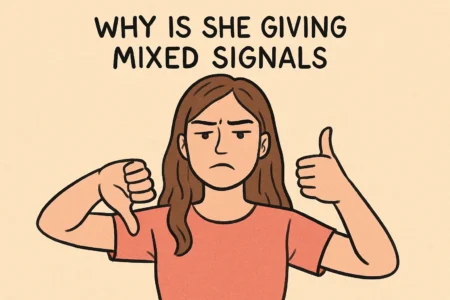It was a Tuesday. I know because Tuesdays are trash day, and the overflowing bin was a silent, plastic monument to our latest argument. My partner, Mark, had promised to take it out. He didn’t. When I brought it up that morning, my voice wound tight. He just sighed. “I forgot. It’s not a big deal.” But it was a big deal. To me, anyway. It was never about the trash. It was about feeling like my requests were optional, like my part in our shared life was invisible.
I wanted to scream, “It’s not about the garbage, it’s about respect!” But I didn’t. I just said, “Fine,” and slammed a cupboard door. A thick, resentful silence settled over our apartment for the rest of the day. That silence was the real enemy. For years, I struggled to truly communicate my needs. I confused hinting with honesty and thought silence was a sign of strength. Learning to speak up, clearly and kindly, changed absolutely everything.
It’s the secret language of every good partnership.
This isn’t about winning or keeping score. It’s about building a foundation of understanding so solid it can handle anything. It’s about being seen and heard for who you are and what you need to feel loved.
More in Relationship Health Category
Key Takeaways
- Know Thyself: You can’t voice a need you don’t understand. Before you say a word, get quiet and figure out the root of your feelings and what you truly require.
- “I Feel” Is Your Superpower: Frame your needs from your own perspective. This avoids blame. Instead of, “You never help,” try, “I feel overwhelmed when I have to manage the chores alone.”
- Timing Is (Almost) Everything: Pick a calm moment. Don’t dive into sensitive topics when one of you is tired, stressed, or just plain hungry.
- Listen to Understand, Not to Reply: This is a two-way street. Genuinely listen to your partner’s side of things. That’s how you find solutions together.
- Give Yourself Grace: Getting good at this is a skill. It takes practice. Be patient with yourself and your partner while you build this new muscle together.
Why Is It So Unbelievably Hard to Just Say What I Need?
If it were easy, nobody would be reading this article. But speaking our deepest needs out loud can feel terrifying. It’s vulnerable. You’re essentially handing a fragile piece of your heart to someone, just hoping they handle it gently. Many of us, especially women, are conditioned to put our needs on the back burner. We learn the role: be the easy-going girlfriend, the supportive wife, the cool partner. The fear of being “too much” can be absolutely paralyzing.
On top of that, our pasts can build some serious walls. If you’ve been shot down, mocked, or flat-out ignored when you spoke up before, of course you’d be hesitant now. You learn to swallow your feelings to stay safe. But that safety comes at a steep price: true intimacy. Tearing down those walls starts with understanding why you built them in the first place.
Am I Just Scared of Being “Needy”?
That word, “needy,” feels like an insult. For the longest time, it was my biggest fear. I spent my early years with Mark trying to be the “cool girl.” I never wanted to be a bother. He’d make plans with friends for a weekend I had secretly hoped we’d spend together, and I’d chirp, “Have fun!” with a smile that didn’t reach my eyes. Inside, I was crumbling. The story I told myself was that a good partner is low-maintenance. Asking for his time? Clingy. Wanting reassurance? Weak.
That story was a complete lie.
We all have needs. It’s part of being human. We need connection, support, affection, security. Pretending you don’t have these needs isn’t strength; it’s a quiet form of self-betrayal. By pretending I was fine, I was the one creating the distance between us. Mark isn’t a mind reader. He saw my smile and took me at my word. The resentment that built up wasn’t on him. It was on me for not being brave enough to tell him what I needed to feel close to him. Voicing a need isn’t being needy. It’s an invitation for your partner to truly know you.
But What If I Genuinely Don’t Know What I Need?
Sometimes the issue is murky. You feel a low-grade hum of frustration, a quiet loneliness, but you can’t pinpoint the source. Something just feels off. This was me a few years ago when I was thinking about a career change. I was snippy with Mark all the time, starting fights over nothing. I blamed him for not being more supportive, but I hadn’t even told him I was miserable at my job.
How could he possibly support a dream I hadn’t even admitted to myself?
This is where you have to get real with yourself. You can’t ask your partner for a map if you have no idea where you’re trying to go. Before you can communicate your needs, you have to dig them up.
- Get Quiet: Seriously. Find a few minutes alone. No phone, no TV. Just sit with your feelings. What’s bubbling up? Don’t judge it. Just notice it.
- Write It Down: Grab a notebook and let it all out. Start with a simple prompt: “Right now, I’m feeling [angry/sad/lonely] because…” or “What’s one thing that would make me feel more loved today?” Don’t edit. Just write. The truth has a funny way of showing up on the page.
- Follow the Feeling: When you feel that flash of anger over the dishes in the sink, pause. Don’t react. Trace it back. Is it really about the dishes? Or is it about feeling like you’re carrying the entire mental load of the household? The core need isn’t a clean sink. It’s partnership.
Okay, So How Do I Actually Start Saying This Stuff Out Loud?
You’ve done the soul-searching. You’ve identified the real need hiding beneath the frustration. Now for the scary part: saying it. This is where your approach makes all the difference. It’s not just what you say; it’s how you say it. The goal is to open a door for connection, not to start a war. The right approach turns a potential fight into a moment of getting closer.
Think of it as an invitation, not an accusation.
You’re inviting your partner into your world. That takes guts, but it also takes a game plan. Without one, our emotions can take over, and we end up right back in our old, unhelpful patterns. These strategies are all about keeping the conversation loving, constructive, and actually moving forward.
Is There a Magic Formula for Phrasing Things?
Pretty much, yes. The most powerful tool in your entire relationship toolkit is the “I” statement. This one little tweak in your language changes everything. It shifts the conversation from what your partner did wrong to how you feel. It’s the difference between pointing a finger and holding out your hand.
“You” statements are basically accusations. Think about it:
- “You never listen.”
- “You are always so defensive.”
- “You don’t care.”
These phrases are guaranteed to put your partner on the defensive. They hear an attack, and they’ll either defend, shut down, or fire back. The conversation dies right there.
“I” statements, however, are about your truth. They can’t really be argued with because they are about your feelings. The formula is simple: I feel [your emotion] when [the specific, non-judgmental situation] because [the impact on you]. I would really love it if [a positive request].
Let’s try that again:
- “I feel unheard when I’m talking and I see you on your phone, because it makes me feel like I’m not important. I would love it if we could have tech-free talks.”
- “I feel really anxious when we’re running late, because I worry about being disrespectful to other people. I would love it if we could try to leave 10 minutes earlier.”
- “I feel hurt when I share something vulnerable and the subject gets changed, because it makes me feel dismissed. I’d love it if we could just stay on the topic until I feel understood.”
See the shift? You’re owning your feelings and offering a clear, positive path forward. You’re starting a dialogue, not a dogfight.
When Is the Right Time to Talk About Big Things?
Picture this: you try to have a deep, meaningful conversation while your partner is frantically searching for their keys, or the second they walk in the door after a brutal day at work. It’s a guaranteed failure. Picking the right time and place to talk about your needs is just as crucial as the words you choose.
The setting matters. You wouldn’t try to have a heart-to-heart in the middle of a loud party. A serious conversation needs a backdrop of calm and respect.
There’s a handy acronym therapists use: HALT. Don’t have important talks when either of you is Hungry, Angry, Lonely, or Tired. When we’re physically or emotionally depleted, our ability to be patient and empathetic goes right out the window.
Instead, be deliberate. Set yourselves up for success. This might even mean scheduling the chat. It can feel a little weird at first, but it shows immense respect for each other and the relationship. Try saying, “Hey, something’s been on my mind and I’d love to talk it through with you. It’s important to me, so I want to make sure we’re both focused. Is sometime after dinner tonight a good time?” This gives them a heads-up and ensures you both show up ready to connect.
What If I Say All the Right Things and They Still Don’t Get It?
This is where it gets really tough. You’ve done your homework. You figured out your need, you used a flawless “I” statement, you picked the perfect time. You open up your heart, and you get… a blank look. Or defensiveness. Or they just completely miss the point. It can feel like you’re speaking a different language. The urge to give up and retreat into silence is huge. See? It’s pointless.
But don’t throw in the towel.
More often than not, a communication breakdown isn’t about a lack of love or care. It’s a sign you need to look at the whole picture. Communication is more than just words. Tone, body language, and—this is a big one—our ability to listen are all part of the dance. If the message isn’t landing, it’s time to look at the whole performance.
Is It Really All About the Words I’m Using?
Words are just the tip of the iceberg. The research of psychologist Albert Mehrabian famously suggested that the vast majority of our communication is non-verbal. Your body language and tone of voice can either back up your words or completely betray them.
I learned this one the hard way. I used to be the queen of the passive-aggressive “I’m fine.” Mark would ask what was wrong, and I’d say, “I’m fine,” while my arms were crossed, my jaw was tight, and my voice was dripping with ice. My words said one thing, but my body was screaming another. It was confusing for him. He heard “fine,” but he saw “furious.” He couldn’t win. If he believed my words, I’d get mad. If he questioned my words, I’d snap, “I told you, I’m fine!”
For your message to land, your whole self has to be on the same page.
- Look at them. Eye contact says you’re being honest and you’re engaged.
- Open up your posture. Uncross your arms. Turn towards them.
- Check your tone. Is your voice calm? Or is it laced with anger or sarcasm? Take a deep breath before you speak. Your whole vibe should say, “I want to connect,” not “I want to fight.”
Am I Actually Listening to Them, Too?
When we’re desperate to be heard, we often forget that this is supposed to be a dialogue, not a monologue. You can’t just state your needs and expect them to be met if you aren’t also willing to hear your partner out. This is where active listening comes in. It means listening to understand, not just to find a gap where you can make your next point.
Active listening is about giving your partner your full attention. It’s about getting curious about their world, even when it’s different from yours. A study from Northwestern University highlights that this kind of mutual understanding is a cornerstone of healthy relationships. It’s also about validating their feelings. Validation doesn’t mean you agree. It just means you’re saying, “I hear you, and I get why you feel that way.”
Here’s how to do it:
- Repeat it back. After they speak, paraphrase what you heard. “Okay, so what I’m hearing is that when I bring this up right after work, you feel ambushed. Is that right?” This clears up so much confusion.
- Ask curious questions. Encourage them to say more. “Can you tell me more about that?” or “What’s the hardest part of this for you?”
- Acknowledge their reality. Use phrases like, “That makes sense,” or “I can see how you’d feel that way.” This is like pouring water on a fire. When your partner feels heard, they’ll be so much more open to hearing you.
How Do We Make This Our New Normal?
Having one successful, hard conversation is a huge win. But creating a relationship where open communication is just how you operate? That’s the real prize. This isn’t about a single fix; it’s about changing the whole culture of your relationship, one conversation at a time, until being vulnerable feels safer than being silent.
This shift takes a real, conscious effort from both of you. It’s a commitment to a new way of being together. The goal is to create a space where needs can be shared without fear, where they’re seen as crucial information to help you love each other better. It’s a long-term project, but it’s the best renovation you could ever invest in.
Can We Really Create a Safe Space for Honesty?
Psychological safety is everything. If you’re afraid that your feelings will be dismissed or thrown back in your face during the next fight, you will never, ever open up. A safe space means that honesty is respected, even when it’s uncomfortable.
My partner and I had to build this on purpose. We made a pact. When one of us brings up a need, there are rules. No eye-rolling. No scoffing. No interrupting. We listen. All the way. And we never, ever use a past vulnerability as a weapon in a current argument. That’s the ultimate deal-breaker.
Creating this safety can be helped by a ritual. Many couples swear by a “weekly check-in.” It’s a set time—maybe Sunday night—to ask a few simple questions:
- How are you feeling about us this week?
- Was there anything I did this week that made you feel really loved?
- Was there anything that happened this week that was tough for you?
- What’s one thing I can do for you in the coming week?
This takes the pressure off. It guarantees you both have a dedicated time to talk before small things morph into huge resentments.
What Does a “Good” Argument Even Look Like?
Let’s get one thing straight: conflict isn’t going anywhere. The healthiest couples still disagree. The difference is how they do it. In a strong relationship, an argument isn’t a fight to the death. It’s a problem you solve as a team. The problem is the opponent, not each other. You stand shoulder-to-shoulder, looking at the issue, instead of face-to-face, ready to attack.
This means shifting your whole mindset about disagreements. It means having “fair fighting” rules.
- No “Always” or “Never.” Ban them. They’re rarely true and just make things worse. “You’re always late” is an attack. “It’s happened three times this month, and I’m starting to feel disrespected” is a fact-based place to start.
- Stay on Topic. Don’t bring up that thing that happened last Christmas. Deal with the issue at hand.
- Take a Break. If you feel your blood pressure rising, it’s not just okay—it’s smart—to call a timeout. Agree to come back in 20 minutes. This isn’t about running away; it’s about calming down so you can actually talk.
- Aim for Repair. The goal is always to come back together. An argument should end when both people feel heard and you have a plan. It might end with an apology, or just a deeper understanding of where the other person is coming from.
Moving to the Next Level: What About the Deeper Stuff?
Once you get the hang of using “I” statements and active listening for everyday issues, you can start using these tools for the bigger, more complex needs that define real intimacy. I’m talking about the needs of the heart: for affection, validation, shared dreams, and emotional connection.
These can be the scariest needs to voice because they are so vulnerable. Asking for help with the kitchen feels practical. Asking for more non-sexual touch can feel like you’re begging, hitting all those old “needy” fears. But this is where the real gold is. Being brave enough to talk about these deeper needs is what turns a good partnership into a great one.
How Do I Ask for More Emotional Intimacy?
For a long time, I felt a quiet ache in my relationship. I knew Mark loved me, but I didn’t always feel loved. I finally realized that I was missing the small, everyday gestures of connection. I’m a person who needs physical touch to feel secure—a hand on my back as he walks by, holding hands on the couch, a real hug when he gets home.
Bringing this up felt terrifying. I didn’t want him to feel criticized or like his affection was now a chore. I picked a quiet moment and said, “You know, I’ve been thinking about what makes me feel really connected to you, and I’ve realized that small moments of physical touch are huge for me. It’s like it recharges my battery. Could we try to be more intentional about things like that? It would mean so much to me.”
Because we had built that foundation of safety, he didn’t get defensive. He got curious. He asked questions. And then he shared his own needs for connection (more words of appreciation, it turned out). It became one of the best conversations we’ve ever had. When you talk about these deeper needs, be specific and positive. Frame it as what you would love, not as what they’re failing to do.
What Do Boundaries Have to Do With This?
Communicating your needs and setting healthy boundaries are two sides of the same coin. A need is what you require to feel good; a boundary is the line you draw to protect yourself and that need. A boundary isn’t an ultimatum. It’s a clear, calm statement of what you will do to take care of yourself.
Your need might be: “I need to feel present with you on our date nights.” The boundary sounds like this: “I feel really disconnected when you’re on your phone while we’re at dinner. If you need to check it, that’s fine, but I’m going to put my own phone away and just enjoy my meal until you’re ready to be present with me.”
See? It’s not a threat. It’s not, “If you check your phone one more time, we’re done!” It’s a calm, self-respecting action that protects the quality of your time together. It teaches people how to treat you. Healthy boundaries are a sign of self-love, and they are absolutely essential for a thriving relationship. They make sure that while you’re loving someone else, you don’t forget to love yourself, too.
The Courage to Let Yourself Be Known
Getting good at communicating your needs isn’t something you master overnight. It’s a practice. Some days you’ll nail it, and other days you’ll slip back into old habits. Some conversations will be easy, and others will be incredibly hard. That’s okay. The goal is progress, not perfection.
Every time you choose to speak your truth with kindness, you are building a stronger, more authentic relationship. You are telling your partner, and yourself, that you matter. You are building a bridge of understanding, one brave sentence at a time. It is, without a doubt, some of the most challenging work you can do in a partnership.
But it’s also the most rewarding. To be fully known and fully loved, to be able to stand in your truth and have the person you love most meet you there with understanding—that is everything. It’s worth every awkward conversation and every ounce of courage it takes to finally say what you need.
FAQ – Communicate Your Needs

Why is it often so difficult to express my needs in a relationship?
Expressing your needs can be difficult because it involves vulnerability, and many people have been conditioned to put their needs aside to appear easy-going or supportive. Past experiences of being ignored or mocked can also create walls that make opening up feel risky.
How can I effectively start saying what I need to my partner?
Start by identifying your true feelings and needs through quiet reflection or writing. Choose a calm moment to speak, use ‘I’ statements to own your feelings, and approach the conversation as an invitation to connect rather than an accusation.
What is the most helpful way to phrase my needs during a conversation?
The most helpful approach is to use ‘I’ statements that describe your feelings and specific situations, such as ‘I feel unheard when I’m talking and I see you on your phone because it makes me feel unimportant,’ followed by a positive request for change.
When my partner doesn’t understand or responds defensively, what should I do?
If your partner doesn’t understand or becomes defensive, it’s important to stay calm, continue listening actively, and validate their feelings. Sometimes, understanding requires more patience and clarification, and it’s beneficial to revisit the conversation later when both are receptive.
How do I create a safe space for honest communication in my relationship?
Create safety by establishing mutual rules, such as no interrupting or dismissing feelings, and regularly checking in with each other through scheduled conversations. Consistently listening with empathy and avoiding past grievances in current discussions helps build trust and openness.





